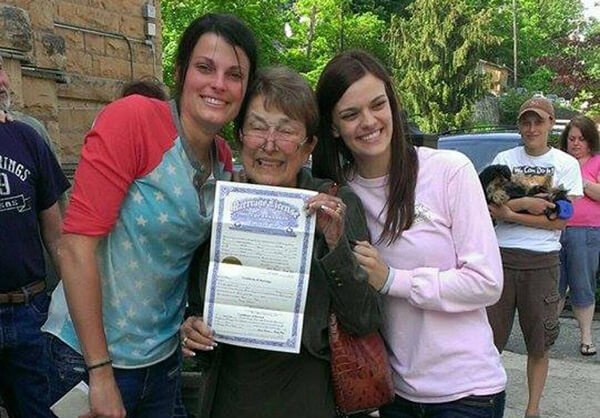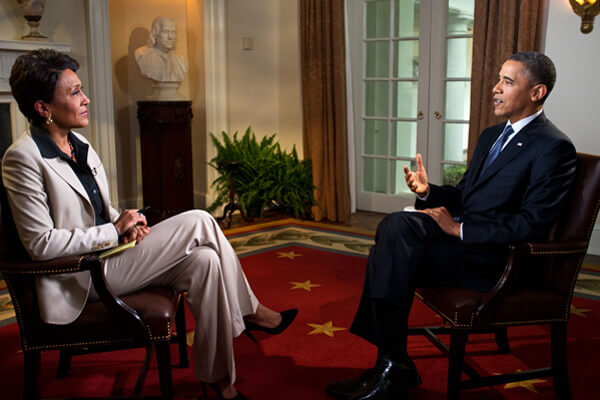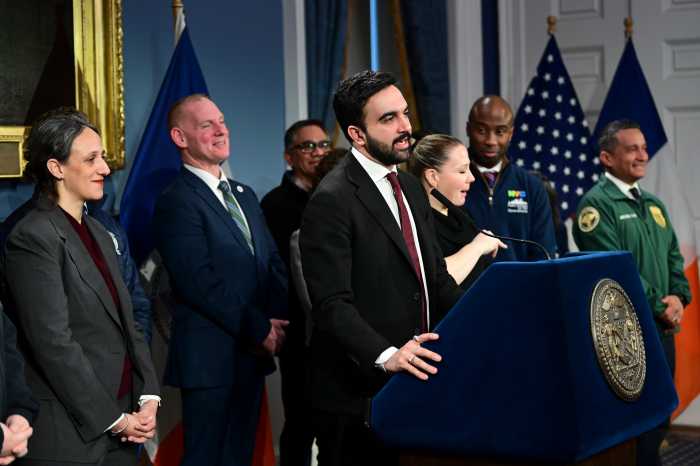Melanie and Vanessa Alenier get a head start on getting a marriage license in Miami on January 5. | EQUALITY FLORIDA
Florida, the nation’s third largest state, became the 36th marriage equality state after the stay on a pro-gay federal district court order expired on January 6, but that was just the first in a week of significant developments in the marriage fight nationwide. Close observers of the issue focused their attention on the Supreme Court’s January 9 private conference, when it began discussing how to handle five pending petitions seeking review of adverse lower court rulings, but other federal courts issued a new round of pro-equality decisions, some placing new states in play.
On January 8 in Atlanta, US District Judge William S. Duffey, Jr., refused to dismiss outright a Georgia marriage equality suit brought by Lambda Legal and local attorneys on behalf of six same-sex couples, some aiming to marry and others seeking recognition for out-of-state marriages. The state is vigorously defending its constitutional and statutory ban, and Duffey accepted some of its arguments, dismissing part of the lawsuit, but concluded the plaintiffs are entitled to proceed on a narrow equal protection theory.
The plaintiffs raised due process and equal protection challenges under the 14th Amendment, arguing the ban violates their fundamental right to marry and discriminates against them because of their gender, gender stereotypes, and sexual orientation.
The state’s first line of defense was to argue that a 1972 Supreme Court decision that a challenge to Minnesota’s ban on same-sex marriage failed to raise a “substantial federal question” obliged Duffey to dismiss the case. Like most other federal judges who have faced this argument, Duffey concluded that “doctrinal developments” in the Supreme Court –– most significantly its failure to even mention the 1972 case in its 2013 Defense of Marriage Act ruling –– meant he was not precluded from ruling on the merits.
He rejected, however, the plaintiffs’ argument that a fundamental right was at issue, accepting the state’s position that all Supreme Court precedents concerning the right to marry involved different-sex couples.
Duffey then turned to the plaintiffs’ equal protection arguments and concluded the ban does not discriminate because of sex, since both men and women are equally forbidden to marry same-sex partners, and he did not accept the plaintiffs’ argument the ban improperly perpetuates gender stereotypes. Instead, he focused on the claim that Georgia discriminates based on sexual orientation, and concluded that the state must merely demonstrate a rational justification in order to defend its ban –– setting as low a legal bar as possible for sustaining the exclusion of same-sex couples from marriage.
Still, in reviewing the state’s argument that it has a legitimate interest in “encouraging the raising of children in homes consisting of a married mother and father; ensuring legal frameworks for protection of children of relationships where unintentional reproduction is possible; ensuring adequate reproduction; fostering a child-centric marriage culture that encourages parents to subordinate their own interests to the needs of their children; and exercising prudence before departing from the traditional definition of marriage,” Duffey said those rationales are merely “conclusory assertions” that “are not supported by specific facts.” The state’s motion to dismiss the lawsuit, he complained, “does not address how Georgia’s asserted interests in child welfare and procreation are advanced by the State’s prohibition on same-sex marriages, and the State’s refusal to recognize lawful marriages performed in other States.”
The plaintiffs challenged the ban’s rational basis by showing actual harms to the welfare of children raised by same-sex couples in denying marriage to their parents, and arguing “that the exclusion does not offer a conceivable benefit to children of opposite-sex couples.” The suit also noted the Supreme Court’s acknowledgement in the DOMA case that forbidding same-sex couples from marrying “humiliates” their children.
“At this stage of the proceedings,” wrote Duffey, “the Court is required to accept these facts as true and consider the allegations in the Amended Complaint in the light most favorable to Plaintiffs.”
The opinion’s language suggests that Duffey came to his conclusion grudgingly but that the state’s failure to present a factual defense was too glaring to ignore.
The Atlanta ruling provided an interesting preview to arguments made the next day, January 9, as a three-judge panel of the Fifth Circuit Court of Appeals heard arguments in New Orleans on three marriage equality appeals. Plaintiffs were appealing an adverse ruling by the federal court in Louisiana, while Texas and Mississippi were appealing marriage equality rulings in those states. The panel included two elderly judges appointed by President Ronald Reagan and only one named to the court by Barack Obama, and so was expected to pose a challenge to the marriage plaintiffs. But Patrick Higginbotham, one of the Reagan appointees, has emerged as a libertarian on social issues, and he actively and skeptically questioned lawyers representing the three states.
The other Reagan appointee, Jerry Smith, harped on the 1972 precedent, saying the Supreme Court “has already decided this case” –– an argument that was successful in November when Ohio, Michigan, Tennessee, and Kentucky appealed marriage equality rulings to the Sixth Circuit, but failed before the Fourth, Seventh, Ninth, and 10th Circuits earlier last year.
The Obama appointee on the panel, James Graves, was clearly dismissive of the 1972 precedent, as was Higginbotham, and both focused in on the same point that concerned Judge Duffey in Atlanta –– that the “justifications” presented in defense of marriage bans never grappled with the question of how they actually advanced a state’s interests.
The opposing attorneys in the arguments largely talked past each other. The states’ lawyers argued, essentially, that marriage was devised as a mechanism to channel procreation into stable families, and that since same-sex couples could not procreate the state had no reason to let them marry. Plaintiff attorneys, by contrast, pointed out, as the Supreme Court had in the DOMA case, that same-sex couples are raising children and so, to the extent the state’s concerns focus on children’s welfare, there is no benefit to denying their parents the right to marry. Having listened to the audio recording of the arguments, I share the view of gay journalists present in the courtroom that the panel is likely to vote 2-1 in favor of marriage equality.
Arguing for the Texas plaintiffs, attorney Daniel Lane strongly urged the judges to make a decision and not wait on the Supreme Court –– despite the fact that the high court was conferencing on other marriage cases that same day. He pointed out that his clients had pressing needs to be married or have their marriages recognized, which could not wait on final resolution of the issue in Washington.
Later on January 9, the Ninth Circuit Court of Appeals, based in San Francisco, in a matter it had been mulling for some time, finally rejected a petition from Idaho Governor Butch Otter, a Republican, that a larger panel of judges reconsider a three-judge marriage equality ruling from October. As is usual in such circumstances, the Ninth Circuit did not issue an opinion explaining why it denied the Idaho petition.
One of the circuit’s most conservative judges, however, Diarmuid O’Scannlain, among three dissenters, wrote a lengthy opinion citing the 1972 precedent and emphasizing that federal courts traditionally abstain from deciding issues about the domestic relations policies of the states. Here, he focused on Supreme Court Justice Anthony Kennedy’s majority opinion in the DOMA case, which faulted the 1996 law’s failure to respect the states’ role in marriage by withholding federal recognition. Federal judges, however, have found plenty of quotable material from Kennedy’s opinion for both sides of the underlying marriage equality argument.
The Ninth Circuit’s denial was widely expected –– even by Otter and his attorney general, who are also seeking Supreme Court review. What was not widely expected was that the Supreme Court would conclude its January 9 conference without announcing review in one or more of the marriage cases. On January 12, it announced that it would not review a Louisiana case, in which Lambda Legal sought to by-pass the Fifth Circuit entirely to appeal a district court loss. The plaintiff appeals in the cases involving the four Sixth Circuit states will be taken up at the court’s next conference on January 16.
Also on January 12, US District Judge Karen E. Schreier handed plaintiffs a summary judgment victory in a South Dakota marriage equality case brought on behalf of six same-sex couples by the National Center for Lesbian Rights and local attorneys. It may not be big news these days when a federal district judge rules for marriage equality –– more than three dozen have done so since December 2013 –– but the constitutional theory they rely on is a significant matter. Contrary to Judge Duffey, who dismissed the Georgia plaintiffs’ due process claim, Schreier premised her decision on the fundamental right to marry, rejecting the argument that Supreme Court precedents on this question are not applicable because they involved only different-sex couples.
“The Supreme Court has also refused to describe the right to marriage by reference to the individuals wishing to exercise that right,” she wrote. “The right at stake is not a new right to same-sex marriage, as defendants contend. Instead, the substantive due process right is the right to marry, which right is fundamental.”
Since the right at stake is fundamental, Schreier subjected South Dakota’s ban to “strict scrutiny,” and found that the state’s justifications –– channeling procreation into marriage and proceeding with caution –– flunked the test. Neither was a compelling interest only achievable by denying same-sex couples the right to marry.
Because the Eight Circuit Court of Appeals, in whose jurisdiction South Dakota is located, has not yet issued a marriage equality ruling as part of the current round of litigation, Schreier stayed her order pending the state’s appeal. Eighth Circuit appeals are already pending from marriage equality rulings in Missouri and Arkansas, but oral arguments have not been scheduled.
It’s worth noting that the Supreme Court refused to stay Florida marriage equality ruling even though the 11th Circuit had not yet decided that state’s appeal. The high court is clearly comfortable with allowing such district court orders to go into effect while the appellate process grinds on. It’s hard to see why courts in other states should not follow suit.





































